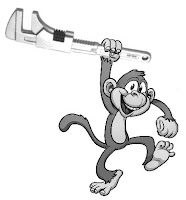A monkey wrench (known as gas grips in the UK) is an adjustable wrench with large jaws that has an adjusting screw in the handle; it can also mean to sabotage something.
In his book The Inner Game of Chess, Andrew Soltis has a chapter full of examples where one player threw a monkey wrench into his opponent's plans by playing an unexpected move. Usually monkey wrenches consist of incorrect assumptions on the part of one of the players; they can be an unexpected quiet move, a move that destroys the guard of another piece, a Zwischenzug, a move that combines both attack and defense or a desperado move.
Soltis advises when calculating a sequence of moves it is essential to make sure obvious or forced moves really are forced.
In the following game Erich Eliskases (1913–1997), a rising star Alekhine tapped as a World Championship contender made not one but two incorrect assumptions. First, that black had to move his King on move 26, then on the very next move that in reply to 27.Bxf7+ the B to be captured.
His opponent, Walter Henneberger (1883–1969), threw two monkey wrenches into Eliskases' calculations. By the way, Eliskases is pronounced Erik E-liss-kah-sis...see Youtube HERE.
Henneberger was a Swiss master whose career as a school teacher afforded him few opportunities to compete in international tournaments. In the early 1900s he won the Swiss Championship four times but was well into middle age before he met world-class opposition.
The final standing in the Libverda:
1) Salo Flohr 9.5
2) Fritz Saemisch 7.5
3) Karl Gilg 7.0
4-6) Max Bluemich, Emil Zinner and Rudolf Pitschak 6.0
7-9) Sandor Boros, Erick Eliskases and Albert Becker 5.5
10) Franz Herzog 4.5
11) Walter Henneberger 2.5
12) August Haida 0.5


No comments:
Post a Comment